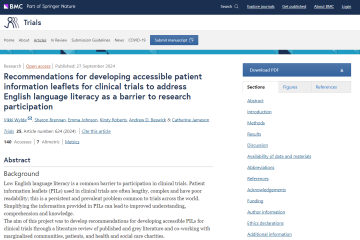Recommendations framework for developing accessible patient information leaflets
- 2 October 2024
Researchers at the NIHR Bristol BRC have worked in partnership with National Voices, marginalised community groups and patients to develop a framework of 74 recommendations aimed at designing accessible patient information leaflets for clinical trials. The recommendations are divided into five topics: formatting, information presentation, writing style, content and accessibility.
Patients taking part in clinical trials are usually given leaflets containing information about the treatment they may receive, its side effects, and the potential risks and benefits of taking part in the trial. Leaflets are often long, complicated and difficult to read. This can prevent people with lower English literacy from taking part in a trial, which reduces diversity among participants. This is a common problem in trials across the world.
The team at Bristol’s BRC wanted to develop recommendations aimed at supporting other researchers in designing accessible patient information leaflets for their trials. They did this by reviewing previous research on the subject and working with marginalised communities, patients, and health and social care charities.
Researchers grouped recommendations into five topics with each topic providing a breakdown of how to design a more inclusive information leaflet:
Formatting – e.g. left-align text and use bullet points, lists or sections to break it up
Information presentation – e.g. present information in a logical order, with key or important messages first while focusing on only one piece of information at a time
Writing style – e.g. use familiar, appropriate and inclusive phrasing, and write in clear and plain language
Content – e.g. if using a front page, provide a brief overview of the trial and avoid too many logos
Accessibility – e.g. translate the leaflet into different languages and provide information on other formats such as braille, large print, plain text, audio or video with voiceover or subtitles
Vikki Wylde, Professor of Musculoskeletal Health at Bristol Medical School and lead author, said:
“Clinical trials need to be more inclusive and reflect the communities they serve. This helps scientists ensure they have a full understanding of how different people respond to treatments and explore whether these treatments are safe in all communities.
“Our recommendations aim to support researchers in developing better study information so that English language literacy is no longer a barrier to trial participation. However, more work is needed to support the creation of generic content that can then be tailored to individual clinical trials.
“During the project we also found that a written patient information leaflet is only one method of providing information. This needs to be supplemented with alternative formats to improve accessibility, for example videos with subtitles provided in multiple languages and interpretation services at research sites.”
